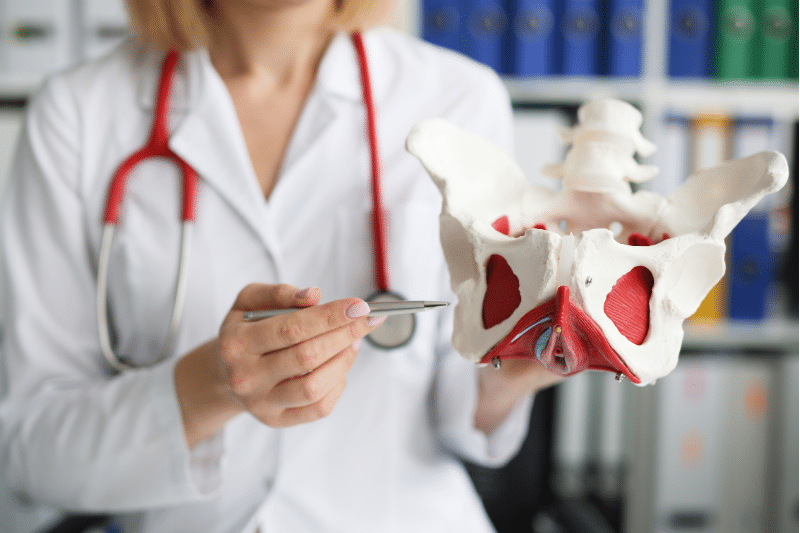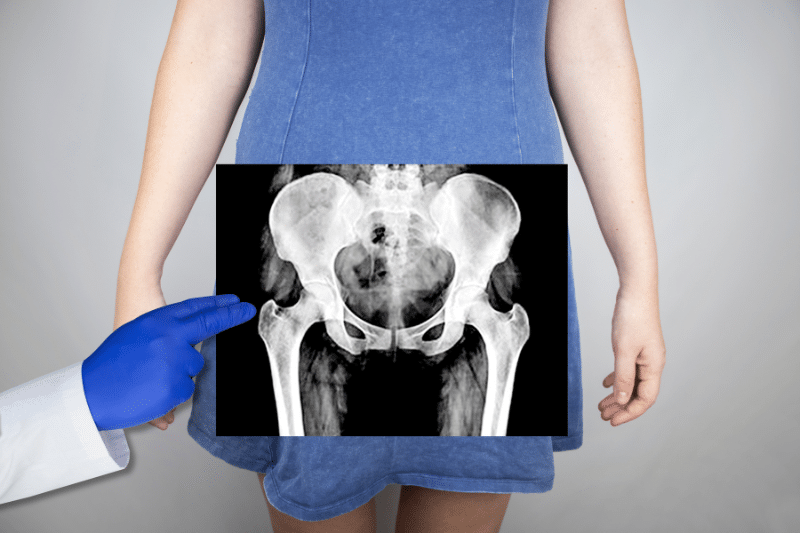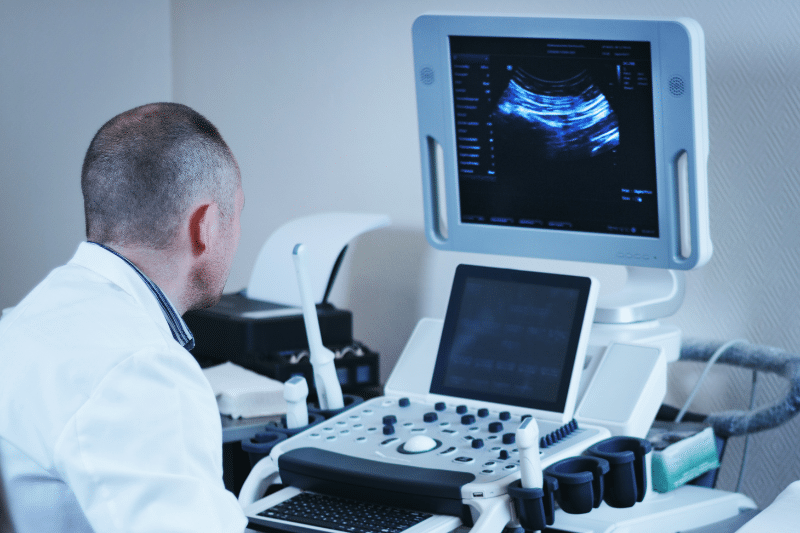Pelvic Congestion Syndrome (PCS), also called pelvic congestion syndrome, is a chronic condition that affects many women, leading to persistent pelvic pain and discomfort. It’s often misunderstood, underdiagnosed, and can impact a woman’s life.
In this guide, we will cover the causes, symptoms, diagnosis, treatment options, and long-term management of PCS, so individuals can find timely relief.
Pelvic Congestion Syndrome (PCS) Overview
What is Pelvic Congestion Syndrome?
Pelvic Congestion Syndrome (PCS) is a medical condition where you have chronic pelvic pain, often caused by varicose veins in the pelvis. These veins become dilated and twisted because the valves inside them can’t function properly. Doctors also refer it as pelvic vein disease, which primarily affects women and involves various symptoms and risk factors.
Furthermore, blood pools and pressure builds up in the pelvic area. PCS is most commonly diagnosed in women of childbearing age, especially those who have had multiple pregnancies.
What Causes Pelvic Congestion or Pelvic Venous Insufficiency Syndrome?
The main cause of PCS is thought to be pelvic vein insufficiency, particularly in the ovarian and internal iliac veins. This insufficiency occurs when the valves in these veins don’t close properly and blood flows back and pools in abnormal veins in the pelvis. Over time this leads to varicose veins which can cause pain and discomfort.
According to the Journal of Vascular Surgery, PCS affects about 15% of women worldwide, with a higher prevalence in those who have experienced multiple pregnancies.
What are the Pelvic Veins and How Do They Relate to PCS?
The pelvic veins (ovarian and internal iliac) drain the pelvic organs back to the heart. In PCS these veins become enlarged, resulting in dilated pelvic veins and pelvic varicose veins, causing the pelvis to become congested. It’s like varicose veins in your legs but in the pelvis and causes different symptoms, pain, and complications.
What Does it Feel Like?
Women with PCS describe the pain as a dull ache in the lower abdomen or pelvis which gets worse after standing, sitting, or having sex. The pain can be more intense during menstruation, sexual intercourse, or after exercise. Some women feel heaviness or fullness in the pelvis and symptoms like bloating, urinary urgency, and lower back pain.
How Serious is Pelvic Congestion Syndrome?
PCS is not life-threatening but can impact a woman’s quality of life. Chronic pain and discomfort can interfere with daily activities, work, and relationships. If left untreated PCS can lead to DVT or CPPS so early diagnosis and treatment is key.
Who is Most at Risk for PCS?
Some of the other risk factors here are:
-
Family history of varicose veins or venous insufficiency.
-
Estrogen (which increases during pregnancy) can weaken the vein walls and cause PCS.
-
Sedentary lifestyle – Lack of exercise leads to poor blood circulation and venous insufficiency.
-
Multiple pregnancies more pressure on the pelvic and ovarian veins during pregnancy.

Pelvic Congestion Syndrome – Diagnosis and Testing
How to Check for Pelvic Congestion Syndrome?
Diagnosing pelvic congestion syndrome is tricky as the symptoms can be similar to other pelvic conditions. But if you have chronic pelvic pain that worsens after a prolonged standing, or during menstruation you need to see a healthcare provider for further evaluation. Your doctor will start with a thorough medical history and physical exam to rule out other causes of your symptoms.
What Tests Are Used to Confirm Pelvic Congestion Syndrome?
Several tests can confirm a diagnosis of PCS:
Pelvic Ultrasound
A pelvic vein ultrasound is the first imaging test used to evaluate the pelvic veins. It can show dilated veins and blood flow in the pelvis.
Doppler Ultrasound
This specialized ultrasound measures the speed and direction of blood flow in the pelvic veins to identify areas of venous insufficiency and venous dilation. It helps in detecting the abnormal dilation of venous channels, particularly within the ovarian and internal iliac veins, which can lead to issues like incompetency of the venous valves and contribute to the symptoms of PCS.
MRI
An MRI can show detailed images of the pelvic organs and veins to diagnose PCS and rule out other conditions.
Venography
This is an invasive test of pelvic venography. Where doctors inject a contrast dye into the veins to visualize any blockages or other abnormalities in the pelvic veins. Consequently, venography is the gold standard for diagnosing PCS.
How is PCS Diagnosed?
PCS affects women more than men but men can also have pelvic venous insufficiency. In men, it is often associated with varicoceles which are varicose veins in the scrotum. Similarly, the diagnostic process for men is similar to women. Futher involves imaging tests to evaluate the pelvic veins and blood flow.
Who to See for Pelvic Congestion Syndrome?
If you think you have PCS you need to see a provider who specializes in vascular conditions or pelvic pain, such as a vascular surgeon, interventional radiologist, or gynecologist. They can diagnose and treat patients with PCS.

Pelvic Congestion Syndrome – Treatment Options
How Do You Fix Pelvic Congestion Syndrome?
Treatment for PCS aims to relieve symptoms, improve blood flow, and prevent complications. There are several options from conservative to minimally invasive.
What are the Non-Surgical Treatments for PCS?
Non-surgical treatments for PCS focus on managing symptoms and circulation. For instance:
Medications
Pain relievers, anti-inflammatory drugs, and hormone therapy can help relieve symptoms. Medications such as gonadotropin-releasing hormone (GnRH) agonists may be prescribed to lower estrogen levels and reduce vein dilation.
Compression Garments
Wearing compression stockings or garments can help improve blood flow and relieve symptoms by applying pressure to the veins.
Lifestyle Changes
Exercising regularly, maintaining a healthy weight, and avoiding prolonged sitting or standing can help manage PCS symptoms.
How Effective Are Compression Garments in Treating PCS?
Compression garments can provide significant relief for women with PCS by improving venous return and reducing the pooling of blood in the pelvic veins.
According to a 2024 study published in the Journal of Vascular Surgery, women who wore compression stockings reported a substantial reduction in pelvic pain and discomfort.
What is the Surgery for Pelvic Congestion?
If conservative treatments are not effective, surgical options may be considered. These include:
Ovarian Vein Embolization
This minimally invasive procedure involves blocking the affected area of veins using coils or other materials to prevent the blood vessels from pooling in the pelvis. It is one of the most common treatments for PCS and has a high success rate.
Hysterectomy
In severe cases, doctors recommend a hysterectomy (removal of the uterus). Particularly if other treatments have failed, and the woman does not plan to have more children.
Laparoscopic Surgery
This procedure involves removing or tying off the affected veins through small incisions in the abdomen. Additionally, it is less common than embolization but may be an option for some women.
How Do You Treat Pelvic Venous Disease?
Treatment for pelvic venous disease, which includes PCS. Subsequently, involves a combination of lifestyle changes, medications, and minimally invasive procedures. Finally, the goal is to relieve symptoms, prevent complications, and improve overall quality of life.
What Happens if Pelvic Congestion is Left Untreated?
If left untreated, PCS can cause:
Chronic Pelvic Pain Syndrome (CPPS)
Long-term, chronic pelvic pain complaints also can contribute to further complications.
Deep Vein Thrombosis (DVT)
Pooling of blood in the pelvic veins can increase the risk of blood clots that can be life-threatening if they travel to the lungs.
Varicose Veins
Untreated PCS can cause more varicose veins to develop in the legs which will cause more pain.
Can Pelvic Congestion Syndrome Cause Other Problems?
In addition to the problems above, PCS can also cause urinary urgency, bowel dysfunction, and sexual discomfort. These can affect your physical, sexual activity, and emotional well-being so you need to seek help.
Can Pelvic Congestion Syndrome Go Away on its Own?
Some women may experience a reduction in symptoms over time, especially after menopause, but PCS doesn’t go away on its own. Treatment is needed to manage symptoms and prevent complications.
Does PCS Go Away After Menopause?
For some women, PCS symptoms may improve after menopause as estrogen levels decline and the pelvic veins constrict. But not all women and some may still have symptoms after menopause.
Can PCS Affect Fertility?
PCS can affect fertility in some women by changing the pelvic environment so an embryo can’t be implanted. However many women with PCS can get pregnant and have successful pregnancies with treatment and management.
What are the Risks of Untreated PCS?
Untreated PCS can cause chronic pain, emotional distress, and reduced quality of life. It can also increase the risk of blood clots, varicose veins, and chronic pelvic pain syndrome. You need to get treated to prevent these and your overall well-being.

Pelvic Congestion Syndrome – Related Conditions and Misconceptions
What is a Venous Disease in the Pelvis?
Pelvic venous disease is a group of conditions that affect the veins in the pelvis including PCS, varicoceles in men, and deep vein thrombosis. Furthermore, characterized by poor blood flow and increased pressure in the veins. Eventually causes pain, discomfort, and other symptoms.
How is PCS related to Chronic Pelvic Pain Syndrome (CPPS)?
PCS is one of the causes of chronic pelvic pain syndrome (CPPS). A condition of persistent pelvic pain for 6 months or more. While CPPS has many causes, PCS is one of the underlying causes, especially in women who have had multiple pregnancies.
Can PCS Be Mistaken for Endometriosis?
Yes, PCS can be mistaken for endometriosis as both can cause chronic pelvic pain and similar symptoms. But they have different causes and different treatments. Endometriosis is the growth of uterine tissue outside the uterus, while PCS is related to venous insufficiency in the pelvic veins. Accurate diagnosis through imaging and other tests is key to differentiating between the two.
Are There Any Psychological Aspects of PCS?
Chronic pain conditions like PCS can have a big psychological impact, anxiety, depression, and stress. The pain and discomfort can affect a woman’s mental health, relationships, and overall well-being. We need to address both the physical and emotional aspects of PCS.

Pelvic Congestion Syndrome – Patient Experience and Support
What to Ask Your Doctor?
If you think you have PCS, ask your doctor:
-
What tests do I need to get diagnosed?
-
What are my treatment options and what are the risks and benefits of each?
-
How can I manage my symptoms at home?
-
Are there any lifestyle changes I can do to improve my condition?
-
What are the long-term prognosis and complications of PCS?
How Do I Manage PCS Pain?
PCS pain management may involve a combination of meds, lifestyle changes, and complementary therapies. Some women find relief through physical therapy, acupuncture, or yoga, others through meds or minimally invasive procedures. Work with your healthcare provider to create a personalized pain management plan.
Are There Support Groups for People with PCS?
Certainly, there are support groups and online communities where women with PCS can connect, share, and support each other. Besides this, they can offer emotional support and practical advice for managing the condition. In fact, some organizations like the Pelvic Pain Support Network and the International Pelvic Pain Society have resources and support for those with PCS.
How Can Family Help with PCS?
Family can help with:
-
Chronic pain can be tough, so just listen, understand < and provide emotional support.
-
Help with household chores, childcare or other stuff can help take some of the stress off.
-
Encourage your loved one to get medical care and self-care.
What Lifestyle Changes Can Help with Chronic Pelvic Pain?
Lifestyle changes that can help with PCS symptoms:
Exercise
Regular physical activity can improve circulation and reduce symptoms.
Healthy Eating
A diet rich in anti-inflammatory foods can reduce inflammation and overall health.
Stress Management
Yoga, meditation, and deep breathing can help with stress which can trigger PCS symptoms.
Avoid Prolonged Sitting
Avoid sitting or standing for long periods. Take breaks to get up move around and change positions.
Moreover, PCS is a challenging condition to deal with. However, with timely diagnosis, treatment, and management many women can find relief and live well. Nevertheless, individuals experiencing PCS symptoms should consult with the healthcare provider to get evaluated.










